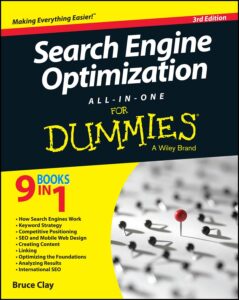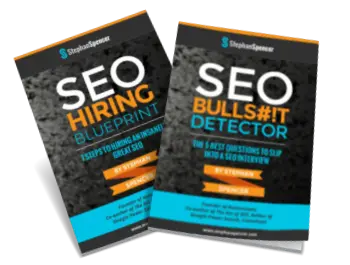Stephan Spencer at Affiliate Summit West 2012
BC: This is the SEO session, The Ask the Pros. My name is Bruce Clay, and for those of you who are not familiar with it, I’ve been doing SEO since 1996. Stephan Spencer and Chris Boggs are with me today.
Thank you.
BC: I think each of us has been with companies doing SEO for more than 12 years. Before we started, we thought we’d allow everybody to introduce themselves. We’ll go ahead and allow that to happen really briefly. Stephan.
I’m Stephan Spencer. I have been doing SEO since the 90s. 1991, I think. No, I’m just kidding. I founded an agency called NetConcepts. I sold it to Cavario in 2010. I’m just a free agent doing my own thing, working on information products, doing a bit of consulting and so forth.
I’m also the co-author of this book, The Art of SEO, which is coming out in its second edition woohoo! in March. And this book as well; I’m the sole author of this one. This is Google Power Search, and it’s about how to find anything on Google. So, just Power Search techniques using parameters in the Google SERP URLs, query operators, and all sorts of tips and tricks.
I also invented a technology platform called GravityStream, which is now part of Covario’s suite of tools. That’s me.
BC: And Chris Boggs.
CB: Hi, I’m Chris Boggs. I’m the newbie. I’ve only been doing SEO since 2000. I am a director at an agency called Rosetta, which is owned by Publicis. But I’m also president of Sempo, which is what I’d like to tell you about.
We’re a nonprofit organization. We’re global. We have a lot of locals. It’s at SEMPO, SEMPO.org. It’s only 1.25 to join it as an individual. I would love to be able to drive some membership this week. I have been doing SEO, like I said, since 2000. I work in a lot of niches, but I do also happen to have a side client who’s a pretty strong player in the affiliate space, so I hope to be able to provide a little bit of insight, uh, specifically for those of you who have affiliate problems.
BC: Now, to fill in a little bit more, they’ve been doing SEO for quite some time. They’ve covered a lot of e-commerce, a lot of different kinds of platforms, and things from health to pharmaceuticals to consumer-type things. Chris is also an editor for SEO Roundtable. I think he’s on the advisory board for search engine strategies.
There’s a lot of knowledge up here. I’ve been doing SEO since 96. I also have a book, Search Engine Optimization: All-in-One For Dummies. It just came out in its second edition, and it’s 746 pages. It’s for big dummies, I guess, a big book. A lot of people have contributed a lot of knowledge over the years in the area of SEO.
Search Engine Optimization All-in-One for Dummies by Bruce Clay
I operate a multinational agency. We’re on five continents outside of the U.S. and focus on everything related to internet marketing. We can cover just about anything. We’ve all been on panels and spoken at conferences.
We’ve all been seeing a lot of questions lately. There are a couple of questions that do come up periodically. I want to encourage everybody, as the screen says if you want to send in questions, you may. Twitter has a space between Affiliate Summit and the number. There was one question, which is who the anonymous guy is, Chris Boggs?
To start it off, there are common; I’d like to start with a Q& kind of thing because there are common things based on the audience. How many people, a show of hands, are webmasters by trade? Okay, how many are site owners? Okay.
How many of you know HTML and can actually modify your own website? How many have built their own website? Okay. How many feel comfortable with SEO in general?
CB: How many aren’t?
BC: How many is this your first SEO session? Okay.
How many work for Google? Good question.
BC: There’s a story behind that, too. When we first started SEO back in 2000, we’d try to explain what SEO was to our families, and they wouldn’t understand it, and we’d say, we get you ranked in Google, and they would say, “Oh, you work for Google.”
And it was far easier to say yes than to try to explain SEO. Most of us have a lot of credit. The initial topics, as I said, that we’d like to cover would probably have general applicability. I’ll have a show of hands. How many people have been hit with a Panda penalty at all? Not that many. How many are concerned about the quality of your content? Okay. How many are concerned about linking? Okay.
I think linking is a question, and I want to ensure everybody I have a vantage point. I believe that the job of SEO is traffic, not necessarily rankings. And I think personalization is going to play a big role in the future. We’re going to want to consider that as we go through this.
The first question that I’m going to cover, and we have three here. The bottom one on the screen, I think. We have a product site where descriptions are taken from the manufacturer’s site, and it has to do, I think, eventually with duplicate content. Would it be better to swap it out, rewrite it, or leave it? How do you get around that kind of stuff?
I’ll chime in first, I guess. This is a common problem. Manufacturer-supplied replicas. Product copy, and you’re using the same stuff as a bazillion other sites out there on the web. I’d like to; maybe I coined a term here, Uniquefy my content by kind of paraphrasing and rewriting and augmenting.
You can uniquefy content by paraphrasing, rewriting, and augmenting. It’s about adding value beyond the generic manufacturer descriptions.
It really doesn’t look value added; it’s not thin content; you’re not a thin affiliate as what Google calls folks who don’t really add any value and are just republishing the same content that everybody else is publishing. You can do this in many different ways. You can have user-generated content in the form of product reviews, forum posts, blog comments, or what have you.
You could add some additional content around product specs and usage, and, you know, ratings and all sorts of things like that are from an expert point of view. Rather than your users generating that, you’ve hired a team internally to do that work. Those are just a few ways that you can uniquefy your content.
And the way I think about it is that there are these things called shingles that if you compare, let’s say, this five or six-word window on one page versus another page, and there are a lot of these shingles or five or six-word windows in common with each other across. The two pages even if you shuffle the paragraphs around, it’s not going to do anything in terms of really changing up the amount of duplicates or overlapping shingles between the two pages.
The value there is just kind of reordering stuff; it’s not going to work for you. So, really paraphrase, rewrite, augment.
CB: And I think Stephan did a good job at kind of taking the topic a little bit broader than just the meta description. Duplication of content based on products is definitely a problem.
You know, there are hundreds, dozens, hundreds, or thousands of sites that have the same exact description. The bottom line and the best way to handle this is by. I like to pronounce it uniquewuhfy instead of uniqueuhfy. Slight difference in the way we use that word, but we both made it up apparently.
A good way to do this in an automated fashion we call it a Concatenation Schema. You create a description. Now, the meta description, typically, since it has very little value from an SEO perspective, is more of a click-through rate value, so you want, that’s your first call to action that people are going to see on the search result page.
You should be thinking sell with your meta description versus optimize. First of all, in order to drive that traffic and to be that first step. But a way to uniquify it is to create a concatenation schema where you have a sentence that uses dynamic parameters. It could be found Products from this category at Josephbank.com or whatever, right?
That is enough to uniquify the meta description, and then you can do it in an automated fashion because you’re not going to go out. I’m sure some of you have sites where there are thousands of products, right? The best way to do it would be to manually write those.
But if you can’t do that, just create a way to concatenate in a category or a product name and that will differentiate the description enough so that it doesn’t get triggered and flagged as a duplicate description from the Google Webmaster Tools perspective, which to me is then the Bible. If they don’t flag it, then it’s good.
BC: Next question has to do, there’s a number of questions here about linking. This one’s a little broad, all things linking. But let’s talk about links. Chris? How do you do it? What do you do with them?
CB: Well, just a level set for those people that are just first time for SEO. You know, there are two things that you do with SEO if you want to boil it down.
You try to increase the relevance of your content, and then you have to drive authority to that content. If you think of it like a yin and yang, there’s relevance and authority. Linking provides authority. Google, when they invented their algorithm, it’s kind of like a co-citation from research papers.
The more that something’s cited, the more authority it has. From a linking perspective, one of the things that, and I think that Bruce probably hinted at this earlier, but really going into 2012 and 2013, one of the things that a lot of people don’t think about is geographically based links.
It’s kind of like the idea that you go for a long tail term in optimization first, and then eventually, you’ll get to rank for the broader head term. It’s the same thing. If you’re focusing in on your linking and thinking of it from a geographical perspective, just as much as you want to go out and get those edu, uh, top-level domain links, maybe gov links, depending on your specific category, you know, you’re going to want to obviously do your competitive analysis and understand who’s linking to your competitors and go out and try to emulate that in some way. However, to differentiate yourself, you might have to go towards local links in 2012.
Yep, definitely, local links will help you in different countries and geographical regions within the U.S. There are a couple of other points about links that could be helpful. One is that you’re only as good as the tools you use, so you need a strong tool set or several tool sets for your link building.
One of them that I think is an essential, must-have tool set is Link Research Tools. Does anyone here use that? I think all of you should be raising your hands. It’s amazing. So it’s linkresearchtools.com. It has 15 different tools. It will find all sorts of opportunities buried within competing sites and sites that are outranking you in the search results and so forth.
CB: Don’t you have an affiliate URL for that?
No, I don’t. That would be probably a good idea. Also, OpenSight Explorer and Majestic SEO. I think those are pretty much essential tools as well.
BC: One of the things I’ll add the quality of your inbound link actually matters. Links have trust scores associated with them. If you have a lot of inbound links from areas or sites that are not trustworthy, it will lower your trust score. One of the things that we have seen, and we’ve actually been able to connect it with Panda, is we do a project called link pruning, where we actually identify low-trust inbound links to sites and get rid of them.
We actually have been able to increase your ranking by decreasing the number of links you have, by decreasing only the ones that are lowest quality. The quality of your inbound link does in fact matter. The other thing to keep track of is that if you’re purchasing links, Google is very much on the warpath.
If they can determine that you are purchasing links, they will penalize you. That has happened over and over and over again, and there’s no exemption from it. And if it happens, you don’t know why you lost your rankings. One of the common characteristics is the 51 penalty. Your site will go from the top 10 immediately to page five.
Chances are they caught you doing something bad with lynx because that’s one of the common characteristics. If you’ve ever had that penalty, that’s one of the things to consider when you’re looking at links. And we have more to talk about on links if you want to come up afterward.
CB: Can I actually add one thing? As I was picturing you and your gardening gloves doing pruning, it reminded me of.
Thanks. What was he wearing?
CB: No, let’s not go that far. Let’s not go there. It reminded me really of what he mentioned about this bad neighborhood idea. There’s a joke, kind of, the other PPC, you know, pay per click, the other PPC is pills, porn, and casinos, right?
Those are considered “the bad neighborhoods.” If you’re going out to get links and you find, even as simple as something on a directory page where it’s a category that’s specifically dedicated to, let’s say, mesothelioma or whatever, right, and there’s suddenly right there there’s a link to Viagra 2.
Just go away, walk away. You need to try to keep that in mind. You can when you’re vetting where you want to get your links from, keep an eye out for those signals that it doesn’t, it looks like the page is really, or even the site itself is really made more to probably promote some of those pills, porn and casino sites.
And then they have this other business that they pull in. Try to stay within your category, but also think of degrees of separation, right? You might research a ton of auto insurance if you do auto insurance. And then you’re going to get to the end of the road, or you’re going to want to move along.
Think of one degree of separation away from that, and that might be an auto repair shop or something, right? Typically, they take auto insurance. And personally, I would use that for my keyword research as well. Think about it from a degree of separation perspective, and try to stay at least semantically connected to your main topic when you’re building links.
Even if you’re going after really high-value sites, just the fact that you’re being too aggressive with the anchor text that’s being used, if it looks too commercial or too kind of artificial, in that people are linking to you with used cars San Diego or whatever the keyword rich phrases that you’re targeting, you’ll get a keyword level penalty.
For that keyword and for that landing page that you’re targeting with those links, you’ll just disappear from the Google search results. Bear that in mind too. It’s not on a site-wide level. It’s not going to affect your rankings for your brand terms. But just for that keyword that you’ve been overly aggressively going after in the anchor text, you’ll just vanish.
BC: We have a fair number of questions on specific topics. As I said, we’re not; the questions seem to be flowing pretty quickly. If we don’t cover your question, please come up afterward, or we’ll meet in the hallway, or we’ll figure out how to get your answers to you. There were a couple of questions. One question that rolled off the screen is: How do you acquire links without work?
CB: Build great content.
BC: How do you acquire links? If everybody could buy links, pretty soon, the top 10 in Google would go to whoever has the most money. That is not Google’s intent.
Understand that Google is discouraging the easy way out. As was alluded to, the best way to get links is to earn them. And I’m going to make a general statement. How many people here want to be in the top three for their major keywords? Pretty easy. How many people honestly believe the quality of your site?
It is better than 1 million other sites that you have earned the right to be in the top three. Because what we have seen time and time again is sites that are not quality sites. They get upset because other sites that are not quality sites outrank them.
CB: Spam means sites positioned above mine.
BC: You understand where I’m going. The easiest way to rank is to earn it because, anything else, Google has probably got several people in a room somewhere we’re trying to fight. Google is a relevant search result engine, and they don’t like the fact that you haven’t earned it. So, buying it is definitely not what Google wants.
Everybody should just understand that. That Google has rooms of PhDs out fighting this. And it is not; even if you could win today, you’re not going to win in a month or three months. It is a short-term, very expensive strategy that Google is on the warpath against.
Field of Dreams
But yet, if you create great content, that doesn’t mean that you’re necessarily going to get the links, right? Build it, and they will come; what was that movie, Field of Dreams, right? I think you need a two-pronged strategy here. You’ve got to build that fantastic content with the viral hooks, the angle that will really pique people’s interest and want them to retweet and share and so forth, favorite it, et cetera, et cetera.
But also you need to seed it into social media through not just some no-name accounts but ideally power user accounts on those social sites, right? Whether it’s video or, of course, YouTube, it is a primary place of focus. But you know, Facebook and there are specialty social sites like Curtsy for women-focused content.
And just a range of different sites, but without having any kind of following or street cred in that social community. And you try to post your content there, try to get it to spread. Go viral within there and spread good luck. Not gonna happen.
CB: Keep in mind, too, that the grandfather of social is blogs. Everyone’s so enamored with Facebook and Twitter and so on and so forth that they forget the power of blogs and why, you know, blogs, I think, are the cornerstone of social media. There should be a lot of blog-related work. And, you know, as a specific example to what you were saying, Norelco did a quick survey of their users and asked how many people use the NCO to shave parts of their body other than their face, and they found that more than 50% said yes.
They decided to build this site that was NCO Shave Everywhere or shave anywhere.com or something like that. It’s still, to this day, one of the greatest firearm marketing case studies because what they did was they seeded it in men’s forums. Right, and men’s blogs. And they ended up canceled their $3 million media spend that they had planned for like two months after they launched it.
Because they hadn’t reached their target traffic goals within the first two weeks, right? It’s all down to the content that you can build. And the more money that you can spend, unfortunately, the more money that you can spend on content that’s unique and that maybe has some flashiness to it, you know, if it’s a digital asset.
And if it’s in, for example, if it’s in financial services, you better damn have a calculator, right? Every freaking financial services site out there has a calculator. If you can create a unique calculator, that’s gonna drive links and buzz. That’s just one of the examples, you know.
This begs the question. Chris, do you shave everywhere?
CB: No, Yeah, okay. That was the official bottom of this presentation.
BC: Pills, porn, and casino. Now, all right. There are a couple of questions here on the topic of removing links. That is a really tough question. It takes about 10 minutes to answer. I’ll save it for the end. Getting inbound links through blogging, guest bloggers, and other things like that.
How do you do that? How do you get bloggers? And I’ll start with a quick story. We had a site come to us. They lost all their rankings. When we analyzed it about five months earlier, they started a campaign where they started soliciting bloggers and giving rewards for bloggers to write a blog post and link to them.
Is this Google Chrome?
BC: No, it wasn’t Google Chrome, but there’s a deja vu feeling about this. And they were amazed that after 50% of all their inbound links were from blogs, they lost all their rankings. How do you do it?
One of the tools I really like inside of Link Research Tools is the thing that gives the distribution of link authority by site type and by theme.
You can see that you have way too many bloggy links compared to all the other sites in the top ten. And that’s pretty cool, right? You can see where you stick out like a sore thumb. But in terms of how you build rapport with bloggers, I think that’s the first question here because you’re not gonna just scam these bloggers into linking to you.
You need to be legit, and one of the ways I do it is by building real relationships with bloggers. I go to conferences like Blog World Expo and speak, and you know, it’s like even conferences where you’re not speaking, but you have good networking opportunities. I mean, for example, BlogHer. You know, there’s a lot of guys in this room.
BlogHer is a women bloggers conference. And you can make all sorts of friends. And it’s like shooting fish in a barrel if you’re single. But a guy actually told me, I’m like, I was in the reception at BlogHer just mingling. And one of the few guys in there, I go up and ask him some questions and stuff.
And he’s like, “You know, what, why are you here?” And he’s like, “Dude, it’s like shooting fish in a barrel. It’s freaking awesome.” It’s pretty amazing, though. It’s real-world connections through conferences and meetups and things like that. Who does MeetUp.com type of events? Yeah, those are pretty cool.
CB: Who wasn’t at Gilly’s last night that was supposed to be?
And don’t just start off by saying, “Hi, nice to meet you. You want to get married”, but instead, you know, it’s “Hi, nice to meet you.” You know, let’s just talk about slowly building a relationship here rather than ask for the link straight off.
You’re gonna have lots of interactions with them. You’re gonna add value and and share expertise and and shared interests and stuff like that.
BC: And you should find your evangelist.
CB: Yeah, I would say start with. The influencers within any blog category find your evangelist.
Shoe Money, many of you may have seen him this morning, back in the days when he was just an SEO, and he used to speak at search conferences before he became the big, awesome shoe money.
Great guy who knows a lot of things. He wrote a cool post about his new setup that he had on Adele, right? He got some sort of a cool screen, and he wrote a post, and Dell sent him. A whole new extra setup or whatever because they realized his influence. And this was before influence was really like an understood term in internet marketing.
Right? So Dell was very progressive and giving him that. And then they, not only that, but they said, and I don’t know if shoe money thought of this or Dell thought of it, but they said, “why don’t you do a little contest and have your readers.” Say what their dream Dell set up would be and then they developed, they got all this content developed and the winner of that contest got that dream set up.
Right? To me, it’s good old-fashioned PR. Right? And let’s be honest: we’re marketers, and it’s about spending money to make money. And in the case of getting influence, I think it’s still really a lot of people just forget. Good old basic PR tactics. And that’s why we’re here, right? It is to network and to get buzz around our products.
BC: Now, there’s a session on link building following us. I think it’s a three C. If you’re going to want to pursue a lot of this, it would follow that. I’m not sure, though, that they’re going to talk about people penalizing you by linking to you. This is a known problem. I’ve had many conversations with Matt Cutts at Google about exactly this problem.
It is absolutely the case that a competitor can hurt you. The best thing that Google has said so far is if you can determine that that has happened, there’s no official way to disavow the link, but you can report it to the spam team yourself and indicate that you do not solicit it, you didn’t pay for it, you didn’t cause it and they will consider that.
But usually, the way you know you have that happen is you see a penalty that comes out of nowhere. And unfortunately, getting rid of penalties is a very time-consuming process. Months.
Who’s heard of the term, or the phrase negative SEO, anyone?
CB: It’s also called black SEO.
Black SEO is about targeting sites to tarnish their reputation with Google. It’s evil, and while it can happen to you, it’s not a strategy to follow.
Right, that’s where you’re actually targeting sites, and please don’t do this. This is evil, but this can happen to you.
CB: All’s fair in love and war, baby.
We know what color you wear, but no, I was just kidding. It’s cool to go after other sites and tarnish their reputation with Google, but it happens all the time. And there are tools out there that will build dodgy links for free. You don’t even have to pay, and you don’t even have to buy the dodgy links from the competitor.
You can use a tool to spam blogs, you know, the blog comments and forums and guest books and all this sort of stuff. This sort of negative SEO is alive and well.
CB: It’s something, you know, it, a lot of people, and for a long time, Google said, we can’t penalize you for your inbound links. We can certainly take the value of a link away, right? If we think that the link is paid for, or we think that it’s a nefarious site, or whatever the hell they want to decide that they want to neutralize or sterilize that link, they can do it. But for a long time, the longest time, they said, we can’t penalize you for an inbound link because then your competitor could build inbound links to you.
And now, people, I mean, I guess, finally figured that out, that it does work, and that you can, and in an affiliate space, I would say that that’s probably used more often than you would think, right? I mean, as Bruce said, you’ve had a sudden penalty, and you may want to go. You should be signed up with Google Webmaster Tools, especially.
I mean, if there’s a bare entry point and baseline for doing SEO, you have to get your site verified in Google Webmaster Tools. And once you’re in there, you will see signals within the toolset that will tell you, “Hey, something’s screwed up here,” right? Then, you can go through some of the remediation measures that Bruce mentioned.
BC: No, I’ve had a conversation, again, with Matt at Google. I suggested that they build a Webmaster Tools area or establish a standard where we can go in and put in inbound link URLs and disavow them from our end. Effectively, do not follow them from the recipient end of the link. It was asked by Matt on the podium. I think it was SES New York, or one of the conferences where he was on a panel, for a show of hands of the audience who wanted it, and a fair number of people want it. The only way to protect yourself against links is to block it. And if you can’t block it, then you have no choice but to ask Google to ignore it.
CB: Or you can hire a hacker to
BC: Take down the site. Yeah, there’s different things. I mean, it’s insane. And by the way, one of the ways, an earlier question is how do you get rid of links?
Suppose you can get them to not link to your homepage. If you control links to that subpage, you can change your links to a different URL and then robots.txt out that subpage so that Google will no longer consider it and automatically ignore the links to it. That’s one of the ways that you can get around it, assuming you have control over it.
Link wheels, Pyramids, and things like that are spam tactics, according to Google. Pyramid schemes are the kinds of things where if you link to me, I’ll get two people to link to you. You get two for one, a good deal. Google knows about it. And the best part about this whole thing is Matt is actually at one of the conferences; Matt Cutt runs the spam team at Google.
He’s one of the first 50 employees at Google. And he actually got an invitation to participate in one of those. And that really triggered a lot of action on his part. So, they know about the folks. Google has been fighting spam since it started on September 98. They have probably seen it all.
It’s very difficult to come up with a new tactic. They haven’t, it’s on their list of things to fight, assume they’ll do it. Buying links, link wheels, triangle link schemes, some of these work if you’re under the radar or not caught yet. But it’s only a matter of time. Because Google is not fighting the people that are doing it right. Google has an army fighting people who are doing it wrong. Just understand everything will get caught if you’re cheating the system.
CB: Think of it like a parent. I mean, I got a six-year-old and a four-year-old, and they try these things that I tried when I was a kid, right? I mean, they’re, Google sees all and, and has seen it all.
Trivia question for you guys. Do you know what the name of Google was before it was Google? Who said it?
CB: Somebody got a book. All right. Which one do you want?
There’s Google Power Search or The Art of SEO. I’ll set this one aside for you. Come by before you leave. It’s called Backrub. Before it was Google, it was Backrub.
CB: But they figured they could make more money selling that domain.
BC: No follows. Why don’t we talk a little bit about what a no-follow does? Is it good? Is it bad?
CB: No follow is a link condom. It’s the easiest way to describe it. Essentially, it blocks, allegedly blocks, the value of the link from passing through. There’s this concept of link juice, right? It’s the equity, the authority that I talked about as part of the yin yang, that there’s a lot of authority flowing around the internet. The nofollow was invented because of spam comments.
They figured if you could just automatically sterilize a link from being valuable, then comment spammers would stop comment spamming. And that’s why it came about. Then, people started using the nofollow to do what they did; it was called Link Sculpting, so you would put no follow on certain tags or certain links on your homepage in order to try to focus on the value.
Since your homepage is by nature going to get the strongest links back pointed to it. And if you want to send that link juice down into your site, one of the ways to sculpt it theoretically is by using the nofollow. I personally don’t think it works anymore. Google has said that now if there’s a nofollow, instead of splitting the additional value of said link, it just sterilizes it and then there’s no other link.
Google is trying to get people not to use no-follows internally. The concept of PageRank Sculpting, I think, is still valid, but not using no follows. No follows; what that does is if you have 100 links on a page and 50 of those links are not followed, it doesn’t redistribute the PageRank or link authority that this page has to the remaining 50 links that are followed.
They don’t get twice their share of PageRank because you’ve not followed half of the links. That’s a problem because the whole point of PageRank Sculpting is to take the low-value pages from an SEO standpoint and just kind of carve them away. The login pages, the add to carts, the view cart, and all that sort of stuff.
All the plumbing on the site and low-value pages, such as privacy policy, etc. That you don’t really care to send juice to. How do you effectively pass less juice to those pages and more juice to really important pages like the top-selling or high-margin products and that sort of stuff, and there are few different approaches.
One is Cookie Detection, so this is a legitimate way of basically saying, hey, is this a user or a returning user? I mean, this is used all the time, right? If I’m returning to your site, you might give me a welcome message that is different, or you might provide my cart from the last access, the last visit, right?
A perpetual cart. Now, there are plenty of cases where cookie detection is used for user experiences and user experience purposes. You can use this for SEO purposes, but I’m going to detect whether the browser has cookies, and if it doesn’t, like if it’s Googlebot, I’m not using user agent detection. I’m using cookie detection because of user agent detection. Then you’re starting to get in the area of cloaking, and you can kind of get slammed by Google for that, right?
That’s one way to carve away the shopping cart types of links and so forth. Not have them even visible if cookies are turned off. Because probably your e-commerce site doesn’t even work if cookies are turned off for the user. Another way is to JavaScript the links. But then, Google’s getting really good at, or better and better every day, following and interpreting JavaScript. Executing the JavaScript, getting the links out of there and then following them.
BC: There’s a couple of quick questions. One had to do, does it matter if I’m in a shared hosting environment? The quick answer is it depends upon the performance of the server because performance is part of the algorithm. If you’re in a shared environment versus a dedicated environment, it will impact performance at that level.
CB: If you’re on a shared server with ten porn sites.
BC: Google has changed the penalty for being in a bad hosting environment because of cloud servers. You don’t control what your IP is anymore.
It’s a little bit less diminished. According to Matt, if you’re in an area that has 10,000 porn sites, you’re probably a bad guy. Dropping from the first page to the second page in one day, does it constitute a penalty? It could be a penalty. The issue is, did everybody else on the first page change too?
If you’re the only one that moved, chances are there’s something about your site. And that’s something that triggers a research question. Does it work for Bing and Yahoo just as well as it works for Google? Does that work for you? Does SEO, all the stuff we’ve been talking about doing work for Google and Yahoo?
Bing is actually an easier engine to manipulate. I’m going to leave it there because I don’t want to get into details. I’m not in the game of manipulating in a black hat sense—no, really, I’m not. There are plenty of things that you can do that would be over the top and get you.
It’s a benefit in Bing, but it would actually shoot you in the foot in Google. My suggestion to all of you guys is to focus on Google and do the stuff, the best practices, and the really value-added tactics with your eye on the prize, namely your Google rankings in traffic and, finally, conversions and sales.
But you know, you’ll get some gravy on top. That will also be the Bing and Yahoo rankings and traffic. And that’s not my primary focus. And that’s my suggestion to you it not be your primary focus either.
CB: We’ve actually approached this subject as well, just to make sure that everyone understands Bing is the algorithm for Yahoo also.
Organic search results at Yahoo should almost exactly mirror Bing as a result of a partnership that they reached over a year ago now. Bing, one tactic for SEO for Bing that we’ve tested to some level of success, is Bing has a tendency to break up their search results on the first page and suggest additional modifications and additional qualifiers for the search.
For example, if you type in auto insurance, they may also have “Did you want to look at some auto insurance quotes sites? Did you want to look at some auto insurance comparison sites?” Right, whatever. If you understand The lay of the land for your search results within Bing and you see what they’re typically suggesting, you may want to target from a long tail, and I hope everyone understands the difference between a head term like auto insurance and a long tail term like, auto insurance quotes at Dallas, Texas, right?
The longer the search term is, theoretically, the easier it is to rank for. But you can get some really good long-tail research and do some testing based on what you’re seeing populating within their search results on the first page in terms of these additional relevant subcategories or modified categories.
BC: You’re going to be running into a lot of things like that. As I said, there’s still a session after this and a lot of stuff on linking. When we get into spamming, I think that it’s relevant to talk about spamming a little bit. And let me ask again, show of hands, how many people here are local focus geotargeted versus national?
How many are local? How many of you are nationally targeted campaigns? Are you at all concerned that locals are taking over the search result pages? Does anybody know? It’s going to become more prevalent in the future, mostly because, at an indexing level, the local results come from a place’s database, not from the organic database.
Places do not have to play by the same rules according to the Federal Trade Commission because it’s not the free results the way it’s specified. Places are going to be more dominant on the top of the page. So we’re going to have to understand how to, how things work in that regard. How many of you have brick-and-mortar? How many are just virtual selling online? Okay.
Places results are becoming more dominant. Build content around regions where you have traction, even if you don’t have a physical location.
Wow. You’re going to have a fight. We’re going to go back to what makes you think you’re worth the top three because local results show up right below that. What was the question that brought that up out of curiosity?
CB: Well, there were a couple of questions that rolled by.
BC: One of the things is that we either have to talk faster or you guys have to ask questions slower. I’m not sure which will work better, but it has gone away. Why don’t we talk a little bit about content quality and spamming? Article spinning, things like that.
CB: Can we stay local? Before we jump to that.
BC: We’ll cover local really fast.
CB: Real fast. You’re thinking of a strategy for increasing your local relevance and where you’ll find that is in your analytics. Look to see where your sales are happening, and if there’s a lot happening in New York or LA or whatever, start to build some content around those locations, and you may not think you need local.
But if you try it, you’re going to start to figure out that you can get a lot of additional traffic. And especially if you’re using the data in an actionable manner to drive the strategy.
For those of you who raised your hands, yep, I’m virtual. I don’t have bricks and mortar. You might think, well, how am I going to compete in Google Places and thus in the main Google web search because I’m, you know, just over time, you’re going to see more and more local results infiltrate the Google web search results on a keyword by keyword basis, right?
More and more keywords. Even a non-geographic search that you might think is not necessarily local let’s say, is payday loans. That’s local, and Google’s figured out that you probably, if you’re searching for that, if you’re not an affiliate or a marketer, you’re probably hard up for cash, and you’re looking for someplace local that you can.
Get to cash payroll check, right? They automatically assume that you’re looking for local results when you type in that term without any kind of geographic qualifiers. How do you compete if you’re purely virtual? Don’t just register yourself with a bunch of UPS stores across the U.S. and use those as your locations.
Google will nail you for that sort of nonsense. You think in terms of partnerships that you could forge with other companies that have a strong local presence across the U. S. that you could kind of take over some of their shop space in a way that gives you those sorts of addresses that you can load into Google places.
There are a lot of different signals in places and local that you’re gonna want to take into account. Some have been dialed down over time, like the distance from the city centroid, which is no longer as strong of a signal as it used to be. But certainly, the ratings and reviews are a very strong signal if you want to rank better in local work, and you’re getting ratings and reviews.
BC: One of the things about Google Place is according to the rules, you either must have a physical shop or it must be a service region. People who are plumbers, people don’t usually bring the leak to the plumber. The plumber goes to the leak. What they’ve done is they’ve created the capability to establish a service region where you service a radius because you have a truck, and you go to the problem, but the problem doesn’t come to you.
Those kinds of things exist, but in general, Google prefers you to have a physical address. A notable exception would be like 1,800 Flowers. 1,800 FLOWERS doesn’t physically have flower shops everywhere, but they have their emblem on the window. People can walk in and order 1,800 FLOWERS at all their shops, and they have license agreements.
So 1,800 FLOWERS for those shops qualify. That’s an example of forming a relationship that would work out great for you. Schema.org, if you don’t know about it, hasn’t really caught on yet, but you ought to go there. This is a microformat structure that Google is pushing.
Basically, it helps Google identify ambiguity. If I said orange, Google won’t know if it’s a color or a fruit. Whereas if I had Schema, defined around the word orange, I would be able to say orange the color or orange the fruit. And it would help Google understand things that have multiple definitions.
That’s one of the big things in Schema.org. Yes, Google has penalized people for spamming Google Places. Probably 5%. Right now, Google Places is just horrible. We just took over SEO for this little company called Caesars. You may have heard of them like where we are. It turns out that the Caesars Palace, Google Places entry, was picked up by an affiliate because Google was the first one to try to register it.
Everybody goes to Google Places and clicks on the link. I would go to an affiliate site instead of going straight to Caesars. Would you consider that good for Caesars? Absolutely not. One of the things I think you need to do is to understand that there are things that are hijacks, there are things that are spam, and there are people who will be glad to take over your keywords and things like that.
In about six weeks there’s going to be a tool for actually re sequencing your result within a place’s entry. It’s a little premature to discuss in length.
CB: Hey Bruce, on the Schema.org thing, that’s just a quick tie-in to what we were saying earlier on. That’s a way to uniquify your content, I think, because you’re gonna do a different set of tags than someone else may do.
BC: Yeah, it would. Is anybody here doing article spinning, where you’ll write an article and put it into a site that distributes it to about 800 or many other sites?
Some people are going, “Oh yeah.”
BC: Google has actually published that they are able to pick it up. They have simple algorithms. Does anybody here ever go to college? Anybody here? Does anybody here understand that the same report is published a hundred thousand times? Plagiarism? Have you ever heard of that word? Well, those kinds of software tools are out there. Google has them all. They can tell that this is the same article on all these different sites.
They absolutely do that. What they have stated, and I don’t know, I know I’ve heard it, uh, verbally, uh, is that links that are within spun articles, as soon as it’s a duplicate article, the links are automatically ignored because you can’t create additional links. One of the other problems you run into is whether anybody here is doing syndication of content where you write a piece of content and then sell it to syndication. If you do that, it turns out that it is a spun article. Even if you’re selling it, you have to consider how to recover it. And that’s part of the problem.
One thing I like to do if I’m writing article content that gets syndicated out to other sites as well is in the byline or a little bio at the bottom, not just link to your homepage, but link to the original, the canonical URL of the article on your site.
Work that into your bio so that all these little hubs are all, most of them, hopefully, unless they’ve scraped your content and pulled out the links. Most of these sites are linked to the center of the center spoke, which is you, right? That’s one thing all these sites, or many of them, have in common: they’re linking back to the original source. Try to do that.
BC: One of the next questions has to do with the missing refer data. How many are aware that Google is suppressing some refer data? Google has indicated that if you are logged into Google or you’re using the secured version, which is HTTPS, at Google. They will actually block the keywords from being passed to the referenced page. You cannot see, using a normal analytics tool, what actually is the keyword that caused you to get the traffic. They flipped that over.
CB: Now tell them why it’s bullshit.
BC: They flipped that over by saying you can get the data in Webmaster Tools. Webmaster Tools somehow doesn’t seem to not see it.
CB: The bullshit is that they’re blocking the data for organic search, but if you’re paying for the freaking terms, they’re giving you the data. They’re saying it’s a privacy thing because you’re in HTTPS, but if you click on one of their paid links, they’ll give you the data.
BC: What do you really think, Chris?
CB: We’re seeing anywhere. We’ve averaged out at nine and a half percent, and we’re talking about some pretty large clients from my agency’s perspective. But we’re seeing up to 22%, including for Rosetta.com, of non-referrer stuff. It’s definitely an issue, I think.
BC: And one of the things you’re going to see is as the usage of Google Plus increases, And people realize I can log in to Google Plus and now I have access to all my Gmail stuff and all the other things that Google gives you.
Once people start doing that, those are secured pages. Because they’re not going to give you Google, you know, Gmail information or any of the other information unless it is secured. And as soon as it’s secured, they’re going to start blocking it. Imagine Google giving you a 10% block at 40 million and Facebook has 800 million people. If Google Plus catches on and goes anywhere near the size, we’re going to be losing half of our refer data. Just understand that.
I would expect it to get worse. I think Google is going to get much more aggressive with hiding this kind of data from us.
BC: And I think anybody here believes Google’s in the business of making money. They’re going to figure out a way to take Google Plus and monetize it heavily. I think we’re actually going to see local results. And Google Plus being where Google actually posts the majority of their income within two years.
CB: You know, that’s Google.
BC: They’re calling. That’s Google calling, saying, “Oh, we’ve only got a few minutes left.”
CB: The argument really is, too, that, I mean, from their perspective, and if you think about it, I mean, we are kind of getting greedy as internet marketers, right? We already have way more data than a lot of offline marketing does, so I guess we’re just used to it. Theoretically, 20%of your data, you should still be able to do a pretty damn good job with 80% and be able to fill in the blanks, hopefully. Thank you.
BC: I think that we have plenty of opportunity to understand what’s happening. And one of the things is statistics; one of my degrees is in math, and statistics is 99% accurate on very small sample bases. You don’t need to know how all one million people behaved. If half of a million behaved a certain way, you can extrapolate it into the whole thing.
You just want to know that 80% of the people visiting my site behave this way. You can assume the rest would. But it’s hardly fair, I agree, that Google would take the data away from us. Duplicate content: at what point is it a problem? We only have like two minutes.
Duplicate content is a problem, I think, for the larger your site is, the bigger the issue. Also, if you’re starting with content from somebody else that’s published elsewhere on the web, you’re sunk unless you have way more authority than everybody else, and I’d say that’s probably unlikely.
Duplicate content is the bane of SEO’s existence. It’s not a penalty, but it might feel like one.
Even a site like, say, Cruises.com, where content about cruise lines and various cruises is written. The same content is being used on Orbits and cruises. Orbits.com and so forth and so on. Well, guess who wins and gets, and guess who gets filtered out, right? In the duplicate content filter, Orbits wins because it’s a massive, uh, domain authority. And Cruises.com, the originator of the content, ends up getting filtered out.
CB: I think there are two duplicate content; there are two factors involved. (1) Is the uniquity of the of the specific subject, right? So if there’s only one mouse trap, and that’s the only way to catch a mouse, there’s gonna be a certain amount of duplication. And there’s got to be, but then, the other side of it is the competitive space, right? The more competitive areas, the less that you want, you know, the more of a problem duplicate content can be.
BC: Okay, here are a couple of pieces of homework. Everybody has one of these? Okay. You circle the tens. Okay.
CB: He’s got a bingo marker, in case you need one.
Please put it down; Stephan Spencer is the shiznit. Thank you.
CB: Okay. An anonymous did really well.
BC: They will collect these as you leave. And if you don’t have one, they will just slap you on the back of the head and give you a denoso.
Who wants a free copy of my book? Alright, I think I can get everyone here a free ebook. I can only have a handful of free ebooks. Printed books with me, but I think my publisher’s gonna give me everybody covered. I have at least 15 ebook coupons here, but I will probably be able to cover all of you.
No promises. But come up and give me a business card, or you can email admin@stephanspencer.com. So your choice admin@stephanspencer.com. S-T-E-P-H-A-N.
CB: I don’t have a book, but you can follow me at boggles, BOGGLES, please.
BC: And I’m easy, and I give away free software. If you want a set of SEO tools, which are our tools, anybody wants to give us a card, and it could actually be the same card as you gave Stephan. Just write tools on the back of it. We’ll combine them, um, and I’ll make stuff and figure out how to get you an ebook. And I’ll get you a login to the SEO toolset. No problems, no risks, no obligations. It is now, 1.30ish. We are going to conclude this. If you would please thank the panel.










